With the growth of the company’s PP-RCT piping solutions business continuing to expand, Uponor North America (Uponor) is launching hot potable pipe and fittings to help meet the demand for commercial domestic water systems. Uponor began offering PP-RCT pipe and fittings in 2020 with more than 300 parts for mechanical piping in sizes from ½” Read more
ProPEX

With the growth of the company’s PP-RCT piping solutions business continuing to expand, Uponor North America (Uponor) is launching hot potable pipe and fittings to help meet the demand for commercial domestic water systems.
Uponor began offering PP-RCT pipe and fittings in 2020 with more than 300 parts for mechanical piping in sizes from ½” to 12″ and cold potable piping in sizes from ½” to 8″. Now, with the addition of hot potable piping in sizes from ½” to 8″, Uponor has a comprehensive offering for mechanical and potable applications, all covered by a 10-year limited warranty.
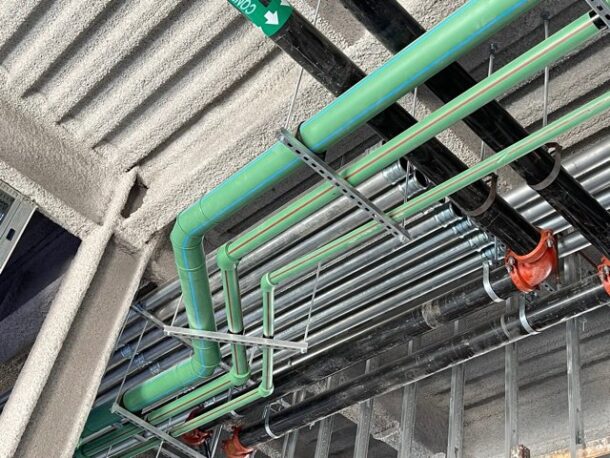
Ritz-Carlton, Scottsdale/Paradise Valley, AZ, Central Plant/Distribution/In-Unit, Cool project – Villas (Condos), Hotel Tower, Casitas (Hotel/Rental), Domestic Hot and Cold, JB Henderson installed PP-RCT and Uponor PEX
“The momentum for Uponor PP-RCT is continuing to build, and the industry is recognizing the benefits of an all-polymer piping system, which includes our PEX-a pipe and ProPEX® fittings in sizes up to 3″,” says Michael Nicholson, business director, PP-RCT, at Uponor. “By including hot potable in our PP-RCT offering, we are now well-positioned to provide our customers with a complete polymer solution for both mechanical piping and domestic water projects.”
To ensure the offering would provide customers with the same high-quality, consistent, and reliable experience the brand is known for, Uponor was deliberate in the timing around bringing PP-RCT hot potable to market.
“We took our time to make sure every detail was addressed right the first time,” says Nicholson. “We worked diligently with our Research & Development, Quality, Engineering, and Construction Services teams to ensure the PP-RCT hot potable offering and system design would provide the same consistent results our customers have come to expect from Uponor.”
To further address demand, the company is also pursuing a multiple-source model that will offer a consistent supply of Uponor PP-RCT for customers and future commercial projects.
“While we have a secure supply of current offerings, including hot potable, Uponor is working to establish a multiple-source model that will expand our portfolio in the future, including larger-diameter PP-RCT pipes and other products,” says Nicholson.
For complete details about the Uponor PP-RCT offering, visit uponor.com/pprct. For information about all other Uponor products, systems, services, and solutions, visit uponor.com.
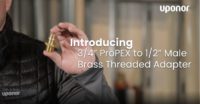
When it comes to hydronic hot-water heating or chilled-water piping installs, speed and accuracy counts. That’s why Uponor is introducing the new ProPEX® brass threaded adapter that connects ¾” PEX to ½” male NPT. This new threaded adapter is made from high-quality brass for durable, consistent performance in hydronic piping applications. Pair it with Uponor Read more
When it comes to hydronic hot-water heating or chilled-water piping installs, speed and accuracy counts. That’s why Uponor is introducing the new ProPEX® brass threaded adapter that connects ¾” PEX to ½” male NPT.
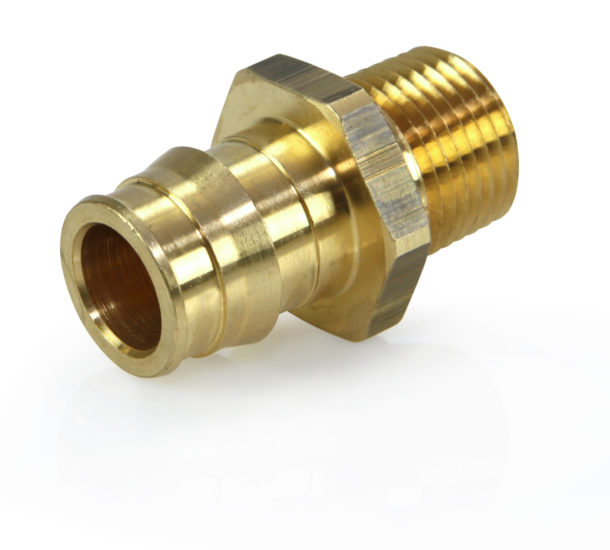
Q5527550 | ProPEX Brass Male Threaded Adapter, ¾” PEX x ½” NPT
This new threaded adapter is made from high-quality brass for durable, consistent performance in hydronic piping applications. Pair it with Uponor ProPEX opposing-port tees, and you have an efficient solution for back-to-back unit configurations.
Need a different configuration? Uponor has a comprehensive offering of transition fittings for converting ProPEX connections to male thread, female thread, copper tubing sweat, copper fitting sweat, and copper fitting press for fast, easy, reliable transitions in hydronic piping applications.
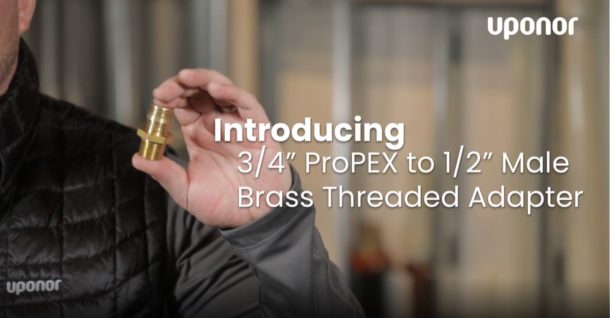
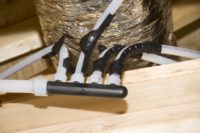
Two directors discuss how switching from PEX-b pipe with crimp-style fittings to Uponor PEX-a pipe with ProPEX® expansion connections made a big impact on their business. Kimbel Mechanical Systems is one of the nation’s preeminent mechanical contractors, specializing in plumbing, HVAC, and electrical work in more than a dozen states on both sides of the Read more
Two directors discuss how switching from PEX-b pipe with crimp-style fittings to Uponor PEX-a pipe with ProPEX® expansion connections made a big impact on their business.
Kimbel Mechanical Systems is one of the nation’s preeminent mechanical contractors, specializing in plumbing, HVAC, and electrical work in more than a dozen states on both sides of the country — from Montana to Massachusetts. Headquartered in Fayetteville, Ark., Kimbel currently maintains 12 regional offices, including six in Arkansas, three in Colorado, and one each in Tennessee, Missouri, and Oklahoma.
The company was originally established as a one-person, new-residential plumbing shop in 1984 in northeast Ohio. A decade later, founder Miles Kimbel relocated and reconstituted his firm 900 miles southwest to pursue new opportunities in Arkansas. Fast-forward a few more years, and Miles’ son Rob Kimbel took over the reins, broadening the company’s reach to include mid- to large-scale multifamily projects, as well as single-family residential.
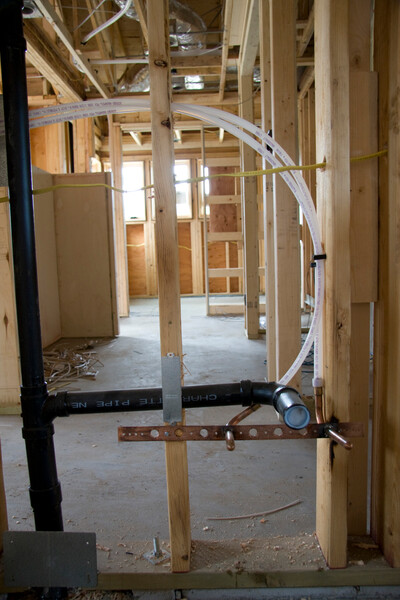
Residential plumbing with Uponor PEX-a and ProPEX fittings.
While the residential side of the business is still mainly involved in single-family work, the commercial side encompasses multifamily projects, hotels, schools, military housing, assisted-living facilities, and other types of large-scale structures. The company’s total number of employees exceeds 500, and they also rely on a large pool of subcontractors for their commercial work.
Several years ago, directors in both halves of Kimbel’s business found themselves struggling with “huge” and mounting warranty problems caused by damaging pipe leaks — damaging to the properties in which the product had been installed, as well as to the company’s professional reputation.
As a result, they decided to begin transitioning away from PEX-b pipe with crimp-style fittings and start using Uponor PEX-a pipe with ASTM F1960 ProPEX® expansion connections for their plumbing projects.
Hear Kimbel’s journey firsthand from Ryan Pinkerton, Director of Operations in Colorado and Tennessee, along with his colleague Mark Evans, Director of Pre-Construction – Commercial Housing, as they detail the factors that drove the company-wide shift, as well as the beneficial impact Uponor PEX-a and the ProPEX expansion method have subsequently had on both sides of their business.
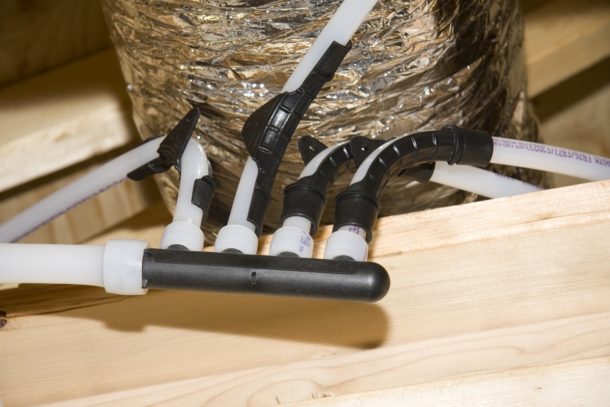
Residential plumbing with Uponor PEX-a and ProPEX fittings.
Residential: Ryan Pinkerton, Director of Operations, Colorado and Tennessee
What is the primary piping product your company uses?
PEX is the known method among the single-family homebuilders we work with today. We might use Schedule 80 CPVC for pipe runs larger than two inches — mains and so forth. But, the majority of our single-family housing work is PEX.
How long have you been using PEX?
We began using PEX not long after I entered the plumbing trade 15 years ago. At that time, for our residential work, we were using PEX-b from another brand. However, we were having so many leaks with the crimp-style connections.
What were some of the issues you encountered with PEX-b crimp connections?
Over-calibrating was an issue. Because you can over-calibrate crimpers, it created a weak spot in the fitting that can crack under use. Also, if you position the crimp ring too far back, it can hold under the air test, but blow off when you turn on the water. The problems were huge, ongoing, and cost us hundreds of thousands of dollars in repairs.
Why did you switch to Uponor PEX-a pipe and the ProPEX® fitting system?
We needed to decrease our warranty costs to repair crimp connections as well as improve the relationships with the homebuilders we served. We also liked the increased water flow that the Uponor system provided. Crimp-style connections reduce the diameter of the PEX-b pipe and, as a result, lower the flow rate. That’s not the case with the ProPEX expansion-type fitting on PEX-a pipe. That has been a key, positive factor for us with the switch.
Commercial: Mark Evans, Director of Pre-Construction – Commercial Housing
Why did your commercial team choose to make the switch?
We use contract installers, and we had so many different people doing the work, it was hard to maintain quality with crimp. The Uponor ProPEX expansion method and the simplicity of the expansion tool for making PEX-a connections worked a lot better for us.
Were there issues with other piping products?
We had numerous leak issues with our larger water mains where we used CPVC at the time. CPVC joints are only as good as the installer who glues them. Once we learned Uponor offered PEX-a in larger diameters, that opportunity to reduce our water-main leak problems also helped drive the switch to Uponor.
Was it difficult for your workers to switch?
Uponor came to our job sites to train our crews on the ProPEX connection method. This training was quick and simple. Once we got everyone on board, the leaks went down drastically. Additionally, our contract plumbing installers are now faster and more productive with Uponor PEX-a. Although most of our contract installers work only for us, we still pay them for piecework. As a result, installation speed really matters for these independent contractors. They know that if you are not fast, you are not profitable. Thanks to the training they received, these contract installers are now familiar working with PEX-a. They have learned to install it quickly without mistakes.
To learn more about Uponor training opportunities for your team, visit uponor.com/training. To learn how Uponor can help bring greater productivity and performance to your residential or commercial projects, visit uponor.com.
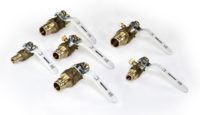
Delivering higher value for residential projects and helping commercial projects meet stringent demands, Uponor North America (Uponor) now offers a newly redesigned line of ProPEX® ball valves for PEX-a plumbing and hydronic distribution applications. The residential and commercial offerings provide superior quality and performance at a competitive cost. Manufactured from premium, lead-free, dezincification-resistant brass, these full-port ball Read more
Delivering higher value for residential projects and helping commercial projects meet stringent demands, Uponor North America (Uponor) now offers a newly redesigned line of ProPEX® ball valves for PEX-a plumbing and hydronic distribution applications.
The residential and commercial offerings provide superior quality and performance at a competitive cost. Manufactured from premium, lead-free, dezincification-resistant brass, these full-port ball valves feature positive tube stops that ensure installers insert the valve into the pipe far enough without overextension. The valves all feature a blowout-proof stem design to ensure a lifetime of trusted reliability that professionals have come to expect from Uponor. In addition, the ASTM F1960 connection method offers a solid, strong seal without the need for glues, torches, or fire watch, providing greater safety and cost savings on job sites.
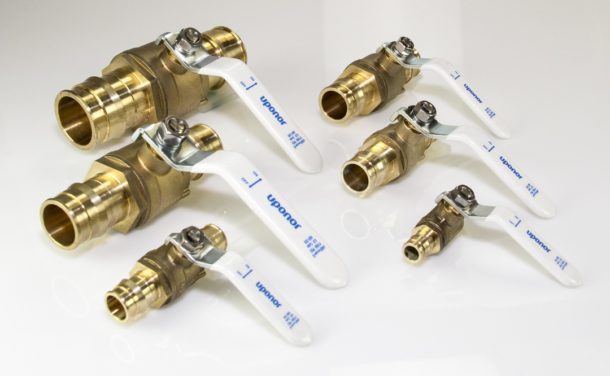
ProPEX LF Brass Commercial Ball Valve
The residential valves are available in sizes from ½” to 1″ and feature a chrome-plated ball along with a stop and drain (waste) option. The commercial valves are available in sizes from ½” to 2″ and feature a stainless-steel ball and stem along with stem extension kits to accommodate insulation thicknesses up to 2″.
“Uponor is committed to providing customers with products they can trust,” says Brett Boyum, vice president, Marketing and Offerings, at Uponor. “These newly redesigned ball valves deliver on quality and reliability while providing greater value to help customers meet the performance and budget demands of today’s residential and commercial projects.”
Both ProPEX ball valve offerings are backed by a five-year warranty and meet IPC, UPC, and IRC building codes in addition to being listed to NSF 14, 61, 359, and 372 for residential and commercial construction. To learn more about this newly redesigned offering, visit https://go.uponor.info/ballvalves.
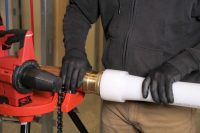
Two piping systems that are taking the domestic-water and hydronic heating and cooling landscape to a new level. These innovative solutions are providing the construction industry with systems that are easier to learn (to help with the skilled-labor shortage), faster to install (to meet tight construction schedules) and provide cleaner installation sites (for jobsite safety) Read more
Two piping systems that are taking the domestic-water and hydronic heating and cooling landscape to a new level. These innovative solutions are providing the construction industry with systems that are easier to learn (to help with the skilled-labor shortage), faster to install (to meet tight construction schedules) and provide cleaner installation sites (for jobsite safety).
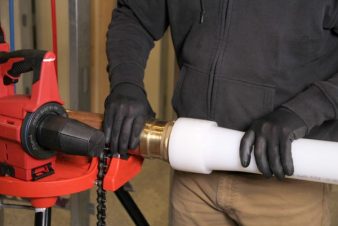 For PEX pipe, popularity is growing for risers, distribution piping and even direct-burial applications in sizes 3″ and down. Its flexibility, fast installations and stable pricing make it appealing for contractors, and its corrosion resistance and durability in freezing conditions make it highly attractive to building owners.
For PEX pipe, popularity is growing for risers, distribution piping and even direct-burial applications in sizes 3″ and down. Its flexibility, fast installations and stable pricing make it appealing for contractors, and its corrosion resistance and durability in freezing conditions make it highly attractive to building owners.
For copper press, contractors are enjoying a safer, flameless connection system that eliminates solder, heat and flux from the job site while offering contractors a metallic system that is faster and easier to learn and quicker to install.
Now, imagine combining the best of both worlds — PEX expansion and copper press — for quicker, easier training, faster installs and safer jobsites to get the job done right in less time.
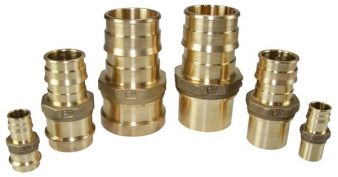 With the launch of the industry’s first ProPEX® expansion to copper press transitions, professionals now have a solution for a completely flameless piping system that eliminates the hassles, costs and hazards of soldering while also providing more efficient installs.
With the launch of the industry’s first ProPEX® expansion to copper press transitions, professionals now have a solution for a completely flameless piping system that eliminates the hassles, costs and hazards of soldering while also providing more efficient installs.
Watch how easy it is to make these transitions.
Manufactured from high-quality, lead-free brass to meet all local and national domestic-water building codes, the transitions are available in both male and female configurations with the female adapters featuring an EPDM rubber O-ring for a dependable seal.
Best of all, they feature a patented design for securely fastening the pipe and fitting together, eliminating the need for a stainless-steel ring commonly used in large-dimension copper press fittings.
Compared to soldering copper, these transitions reduce an overall project timeline by an average of 71%, helping to manage a project’s schedule and, ultimately, the bottom line. And because they are backed by a 25-year transferable limited warranty, the transitions offer additional confidence and peace of mind.
So if you’re like most construction professionals out there, feeling the crunch of the labor shortage but still want the quality of a professional piping system, look to a hybrid PEX expansion and copper press system. The end result can be money in the bank.
To learn more about the transitions, visit uponorpro.com/copperpress_us.

Kim Bliss is the content development manager at Uponor. She can be reached at kim.bliss@uponor.com.
